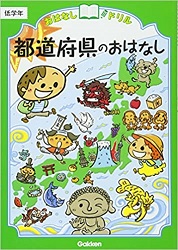Accidentally missed a week, so time to do some catch up
Ehime-prefecture translation
Ehime-prefecture
The mandarin kingdom
Warm throughout the year, Ehime-prefecture with its many sunny days has its mandarin production flourishing.
Particularly, on the slopes of the sea sides, a lot of terraced mandarin fields can be seen, made using stone walls. The light reflecting from these stone walls, the light reflecting from the ocean and the sunlight combined bathes the mandarins in enough light, to allow them to grow very tasty.
Out of the grown mandarins, jam and juice is made. (this feels like the author needed a sentence to fill the page)
Questions:
 For the mandarin’s to grow, what three lights are they bathed in? Fill in the blanks!
For the mandarin’s to grow, what three lights are they bathed in? Fill in the blanks!
Kouchi-prefecture translation
Kouchi-prefecture
Fishing for skipjack tuna
Do you know the fish called skipjack tuna? The fish, that can grow to about 90 centimeters in length swims in schools.
In the Kouchi-prefecture, instead of catching skipjack tuna all at once with a net, “ipponzuri”, where a couple of people catch fish one at a time flourishes.
The caught skipjack tuna is mainly eaten in stuff like sashimi and lightly toasted chopped fish. The skipjack tuna caught using ipponzuri is famous for its freshness and deliciousness.
Questions:
❶ What tool is used when catchin skipjack tuna with the “ipponzuri” method?
❷ Which sentence fits the article? Circle the correct one.
ア Skipjack tuna are fish swimming in schools
イ In the Kouchi-prefecture, skipjack tuna is caught using nets
ウ Skipjack tuna is mainly eaten steamed
Fukuoka-prefecture translation
Fukuoka-prefecture
The god of study
Around 1100 years ago, there was a person called Sugawara no MIchizane. Michizane was a very wise person. Interested in knowledge since his childhood, he became a scholar, celebrated as an “expert of writing”. He spent all his power on making the country better, but he was sentenced for a crime he didn’t commit, and was banished to Dazaifu, todays Fukuoka-prefecture.
Michizane then disappeared, but he was then deified as the god of study. The shrine where Michizane is worshipped is called Tenmanguu. There is a lot of it all accross the country. Out of these, the Tenmanguu shrine is the most visited.
Questions:
❶ Why was Sugawara no Michizane exiled to Dazaifu? Circle the correct answer!
ア Because he spent all his power on bettering the country
イ He didn’t do anything wrong, but he was sentenced
Saga-prefecture translation
Saga-prefecture
Ariake seaweed and mudskipper
Onigiri with dried seaweed sprinkled on top is very tasty, huh?
In the Ariake sea next to the Fukuoka, Saga, Nagasaki and Kumamoto prefectures area, seaweed cultivation flourishes.
Also, the depth of the Ariake sea at the Saga-prefecture is very low, on the tidal flat*, rare fish called mudskippers live. The shape of the fishes hopping around is very unique.
*Tidal flat, a muddy area appearing when the tide recedes
Questions:
❶ How many prefectures does the Ariake sea border?
❷ Circle the correct word about the Ariake sea at the Saga-prefecture
ア Shallow
イ Deep
❸ What fish lives on the tidal flats and hops around?





